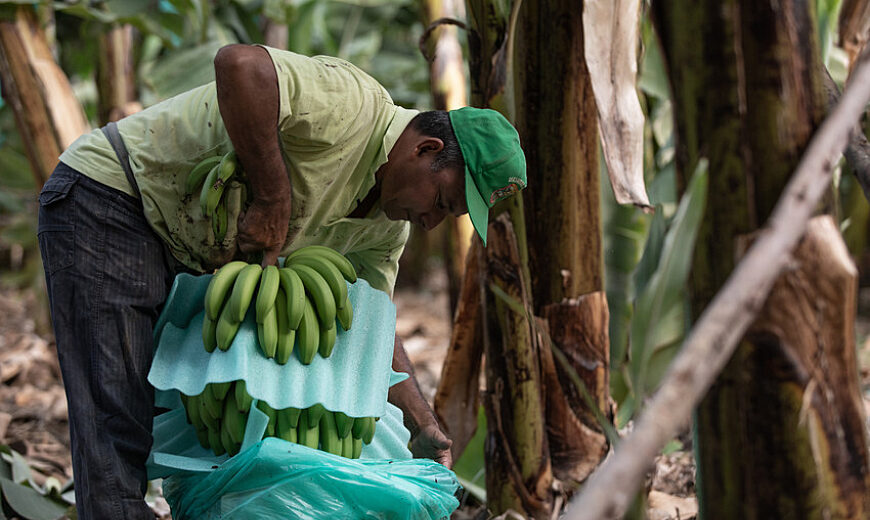Contact the communications team
E-Mail: press@fairtrade.net
11 Oct 2021
Mounting export costs and plummeting import prices are directly impacting banana farmers’ and workers’ livelihoods. The Fairtrade Minimum Price will provide ‘vital support’ to struggling producers.

BONN, Germany – Fairtrade is raising its minimum price for bananas in an effort to counter the effects of rising export costs and dipping import prices on producers’ livelihoods, the global social justice organization has announced.
The eight percent average increase in the Fairtrade Minimum Prices for bananas will come into effect as of 1 January 2022. Contracts for 2022 are currently being negotiated between buyers and producers.
“The financial squeeze on banana producers has been devastating for their livelihoods and a real threat for their long-term gains. An uptick in the Fairtrade Minimum Price will provide vital support for banana producers, especially in these times of distress and global fluctuations in the market,” explained Nicolas Léger, Fairtrade’s global lead for bananas.
Banana producers across the globe are facing increased financial burdens amid soaring banana export costs and record low import prices, placing inordinate pressure on smallholder farmers and agricultural workers and posing a direct threat on their ability to earn a decent living.
According to reports, the rise in banana export costs is being driven by a sharp increase in the price of packaging materials, plus a 60 percent increase in freight costs, with costs set to continue growing in the coming months. The ongoing COVID-19 pandemic has also affected production costs as well as ongoing measures to protect banana plantations from the devastating effects of the fusarium TR4 fungus. Against that backdrop, banana import prices have gone the other way, plummeting to a record 10-year low of less than 10 euros a box.
“It’s critical for the world to know, however, that Fairtrade’s efforts are only one part of the solution when it comes to banana farmers and workers earning a decent living,” Léger continued. “The banana industry as a whole needs to change to make banana farming sustainable in the long term.”
Fairtrade is the only certification scheme with a minimum price – a crucial safety net for producers and a way to build their resilience amid market fluctuations and the ongoing uncertainties of a post-COVID world. Fairtrade reviews this price regularly, in consultation with producers and traders.
Producers will also continue to receive the additional Fairtrade Premium of 1 USD per box of bananas sold, which they can invest in projects of their choice. Banana farmers and workers received more than 193 million euros in Fairtrade Premium over the past five years.
“Fairtrade is the only scheme with effective tools to respond to the social and environmental expectations of consumers and the banana industry,” said Marike de Peña, manager of a Fairtrade certified banana cooperative and Chair of the Dominican Republic’s National Fairtrade Network. “But the question remains as to how farmers at the bottom of the supply chain can respond to all these expectations without a firm industry commitment towards shared responsibility and sustainable prices.”
“The race to the bottom in bananas will exclude more and more smallholders and medium sized companies from farming,” de Peña added. “Fairtrade makes a strong call for change.”
The decision to raise the Fairtrade Minimum Price for bananas comes just months after Fairtrade introduced a Base Wage for plantations and a Living Wage Differential. The Base Wage, which came into effect on 1 July 2021, means wage increases of up to 15 percent for banana workers and a significant step towards creating a living wage for thousands of banana plantation workers worldwide. Fairtrade is the only certification scheme to put such a floor wage in place and make a concrete step towards a living wage.
At the same time, the new Living Wage Differential introduced an additional voluntary payment per box of bananas sold, as a contribution towards a full living wage.
“Producers are going above and beyond to meet the increasing sustainability demands from the market – working towards living wages and incomes, making their farms more environmentally friendly and meeting human rights due diligence requirements. Yet, the market prices do not match these costs, and are falling instead of increasing,” Nicolas Léger continued.
“This is not sustainable. Fair prices are needed now more than ever to meet these increasing demands. At Fairtrade, we are doing our best to ensure this happens.”
E-Mail: press@fairtrade.net